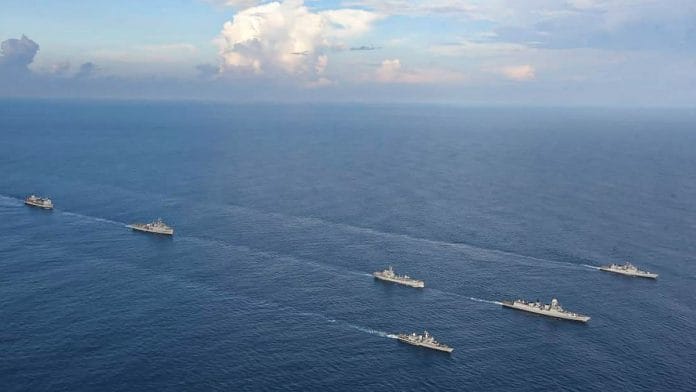
Thank you dear subscribers, we are overwhelmed with your response.
Your Turn is a unique section from ThePrint featuring points of view from its subscribers. If you are a subscriber, have a point of view, please send it to us. If not, do subscribe here: https://theprint.in/
India’s policy towards the region is based on its shared vision of peace and prosperity in the Indo-pacific. The small island countries in the Indian Ocean are vital for India’s energy and maritime security. The island state serves as a vital link to India’s maritime security. For example, almost 80 to 90 percent of the trade and energy transhipment across the Indian Ocean passes through the Exclusive Economic Zone of either Seychelles or Maldives. The Islands can act as sentinels in protecting India’s interest in the region. Since the 1980s, India undertook the role of maritime security provider to Mauritius, Seychelles, the Maldives and Sri Lanka. Military assistance includes the export of patrol boats, helicopters, training and hydrographic services to the three navies and coast guards. Over the last few years, India has also installed coastal radar networks in the Maldives, Mauritius and Seychelles to monitor the ship movement in the region. So far, India’s relationship with the island states are largely based on geopolitical interest. With the aim to counter growing Chinese influence in the region. India need to change this outlooks towards the island countries in the Indian Ocean. The island states are facing major existential threat to their environment from climate change, India’s expertise in ocean science and research can provide a major support to island states in addressing the issues.
The Indian Ocean’s Islands face multiple challenges. Environmental impact is a major worry. The projected impacts of global warming include rising sea levels, stronger tropical cyclones, larger storm surges, increasing sea surface temperatures, and growing acidification of surface waters etc. In addition, maritime pollution is now ubiquitous in the Indian Ocean waters. Pollution including marine litter, plastics, sewage, oil and chemicals, impact the oceans. The Indian Ocean figures among the most highly impacted ecosystems on Earth and the littoral countries count among the world’s most susceptible to coastal environmental risks. The environmental issues are typical to island countries because of the dependency on marine resources for food and livelihood.
The Island States are greatly dependent upon oceans for their economic prosperity and sustainable development. The maritime ecosystems of the Indian Ocean provide food, livelihood and income to millions of people through fisheries, tourism, and transportation etc. Because of the fragile ecological conditions and economic vulnerabilities, the Island States are likely to face many constraints and challenges in pursuing sustainable development or to invest in the Blue Economy. Monitoring marine environments is a daunting task for many island states as they severely lack in infrastructure and capacity to keep a watch on ocean health. Building effective maritime domain awareness is one of the many priorities still out of reach for these island states. Without having proper mechanisms to monitor, assess the sea condition and weather pattern it is impossible for the island state to pursue a blue economy. Indian expertise in ocean science and technology, marine geoscience, operational oceanography, exploration of marine living resources can be leveraged to help the Seychelles, Mauritius and Maldives in protecting their marine resources and habitats. There is a greater need to strengthen the capability of the Indian Ocean Island countries to protect their marine environment.
As part of India’s Indian Ocean strategy, Prime Minister Modi has proposed two pronged strategy for safe, secure and stable maritime domain – The first, SAGAR-Security and Growth for All in the Region; and second, the Indo-Pacific Ocean Initiative. The main thrust of this strategy is to create partnership among the interested states in enhancing maritime security, sustainable use of marine resources, disaster prevention and management. The idea of the new partnership is to build a cooperative framework outside military dimension and provide greater emphasis on the sustainable development and blue economy. The Seychelles, Mauritius and Maldives are already in line with the blue economy and would get a big boost from India. Indian aid to these countries has also significantly increased from approx. 600 Crore in 2016 to 1, 474 Crore in 2022. India has also been offering diplomatic and technical assistance to Seychelles, Mauritius and Maldives to mitigate challenges in maritime domain. One such initiative is a capacity building programme organised by the Ministry of Earth Science (MoES) in the operational oceanography for young scientists from IOR countries, which provides great impetus to the island states in utilizing the ocean science by end users in those countries. Similarly, India should extend many such cooperation in the field of ocean science and technology to further the capability and capacity of these island nations. These archipelagic states occupy a unique geostrategic location in the Indian Ocean. India should play a proactive role in supporting the island states in dealing with both natural calamities and man-made disasters.
Prakash Panneerselvam is an Assistant Professor at the National Institute of Advanced Studies (NIAS), Bengaluru.
These pieces are being published as they have been received – they have not been edited/fact-checked by ThePrint.


COMMENTS